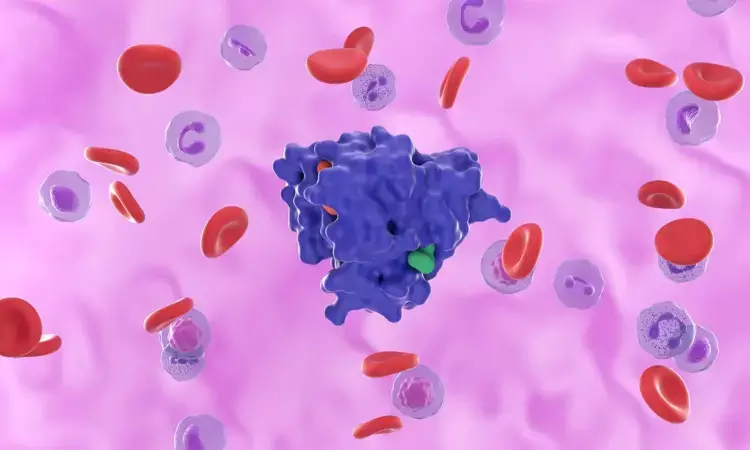- Home
- Medical news & Guidelines
- Anesthesiology
- Cardiology and CTVS
- Critical Care
- Dentistry
- Dermatology
- Diabetes and Endocrinology
- ENT
- Gastroenterology
- Medicine
- Nephrology
- Neurology
- Obstretics-Gynaecology
- Oncology
- Ophthalmology
- Orthopaedics
- Pediatrics-Neonatology
- Psychiatry
- Pulmonology
- Radiology
- Surgery
- Urology
- Laboratory Medicine
- Diet
- Nursing
- Paramedical
- Physiotherapy
- Health news
- Fact Check
- Bone Health Fact Check
- Brain Health Fact Check
- Cancer Related Fact Check
- Child Care Fact Check
- Dental and oral health fact check
- Diabetes and metabolic health fact check
- Diet and Nutrition Fact Check
- Eye and ENT Care Fact Check
- Fitness fact check
- Gut health fact check
- Heart health fact check
- Kidney health fact check
- Medical education fact check
- Men's health fact check
- Respiratory fact check
- Skin and hair care fact check
- Vaccine and Immunization fact check
- Women's health fact check
- AYUSH
- State News
- Andaman and Nicobar Islands
- Andhra Pradesh
- Arunachal Pradesh
- Assam
- Bihar
- Chandigarh
- Chattisgarh
- Dadra and Nagar Haveli
- Daman and Diu
- Delhi
- Goa
- Gujarat
- Haryana
- Himachal Pradesh
- Jammu & Kashmir
- Jharkhand
- Karnataka
- Kerala
- Ladakh
- Lakshadweep
- Madhya Pradesh
- Maharashtra
- Manipur
- Meghalaya
- Mizoram
- Nagaland
- Odisha
- Puducherry
- Punjab
- Rajasthan
- Sikkim
- Tamil Nadu
- Telangana
- Tripura
- Uttar Pradesh
- Uttrakhand
- West Bengal
- Medical Education
- Industry
Sotorasib Promising for Treating Vascular Malformations Associated with KRAS G12C Mutation: NEJM

France: A small French study has shown the effectiveness of sotorasib (Lumakras) in treating severe KRAS G12C-related arteriovenous malformations.
Two adult patients with this life-threatening condition experienced rapid symptom reduction and shrinkage of arteriovenous malformations following treatment with the KRAS inhibitor," the researchers reported in The New England Journal of Medicine.
The study stated, "Targeting KRAS G12C appears to be a promising therapeutic approach for patients with KRAS G12C–related vascular malformations."
KRAS gain-of-function mutations are frequently observed in many cancers, the G12C single-nucleotide mutation is particularly common in non-small-cell lung cancer (NSCLC). The mechanisms driving the progression of KRAS-driven malformations remain incompletely understood, and there are currently no approved treatments for this condition.
Against the above background, Guillaume Canaud, Unité de Médecine Translationnelle et Thérapies Ciblées, Hôpital Necker–Enfants Malades, Paris, France, and colleagues hypothesized that since sotorasib has demonstrated efficacy in patients with NSCLC, it may also be a viable option for individuals with vascular malformations harboring the KRAS G12C mutation.
They showed the effectiveness of sotorasib, a specific KRAS G12C inhibitor, in decreasing the volume of vascular malformations and improving survival in two mouse models carrying a mosaic Kras G12C mutation.
Initially, Canaud and colleagues demonstrated in two mouse models with a KRAS G12C mutation that sotorasib could decrease the volume of vascular malformations and enhance survival. Subsequently, they treated two individuals with the condition, confirmed via lesion biopsy to have the mutation, with 960 mg of sotorasib (eight 120-mg pills) orally every morning during breakfast.
The first patient was a 24-year-old man who had a longstanding arteriovenous malformation on his face despite multiple failed interventions, including 11 endovascular procedures, resulting in blindness and maxillectomy on the affected side. He suffered severe pain, recurrent cellulitis, and hemorrhages, necessitating opioids and antibiotics. After unsuccessful participation in a clinical trial with sirolimus, he was treated with sotorasib.
Within four weeks, symptomatic improvements were noted, including pain reduction, cessation of bleeding, decreased fatigue, and aesthetic changes. Over three months, opioid and antibiotic use ceased, and MRI showed sustained malformation volume reduction over 24 months with no adverse drug effects.
The second patient was a 45-year-old woman who had a vascular malformation affecting her oral cavity and right eustachian tube despite 20 procedures. The malformation caused pain, ear deafness, swallowing difficulty, and speech impairment.
Sotorasib treatment led to swift improvements, including restored hearing, pain relief, and reduced facial and jaw infiltration. Her sotorasib dosage was adjusted due to mild diarrhea, with no other adverse effects reported. Imaging at six months revealed a 19.8% reduction in vascular infiltration around her vestibulocochlear system.
In summary, both patients had rapid reductions in symptoms and arteriovenous malformation size.
"This study underscores the significance of genetic testing in identifying vascular malformations for targeted therapy. While these initial results are promising, further studies are essential to validate them," the researchers concluded.
Reference:
Fraissenon A, et al "Sotorasib for vascular malformations associated with KRAS G12C mutation" N Engl J Med 2024; DOI: 10.1056/NEJMoa2309160.
Dr Kamal Kant Kohli-MBBS, DTCD- a chest specialist with more than 30 years of practice and a flair for writing clinical articles, Dr Kamal Kant Kohli joined Medical Dialogues as a Chief Editor of Medical News. Besides writing articles, as an editor, he proofreads and verifies all the medical content published on Medical Dialogues including those coming from journals, studies,medical conferences,guidelines etc. Email: drkohli@medicaldialogues.in. Contact no. 011-43720751


